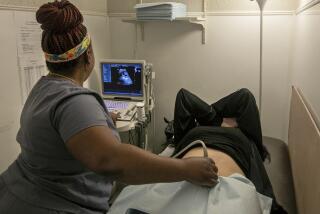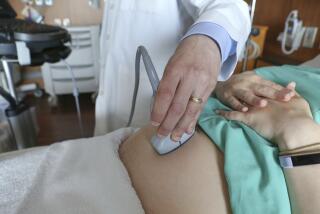Safer, earlier prenatal testing
- Share via
Pregnant women can agonize for weeks or months over whether their child carries the genetic disorder responsible for Down syndrome. Some want to know so they can prepare for the lifetime of care such children will need, others so they can terminate the pregnancy.
Such screening typically isn’t done until the second trimester, however, and the more reliable tests can, in rare cases, cause a miscarriage.
The options are about to improve. A safe new test can be given as early as the 10th week of pregnancy, researchers have reported, accurately identifying fetuses with Down syndrome.
That test alone is expected to increase the number of women who learn that they are carrying a baby with the genetic disorder. But another safe second-trimester test also is emerging. When combined, the screenings promise 94% accuracy, approaching that of today’s more invasive methods.
“What this means is we now have a different option for patients,” said Dr. Mary E. D’Alton, the principal investigator of the study and chief of obstetrics at Columbia-Presbyterian Hospital Medical Center in New York. “Some women would like to know the results of the test in the first trimester, before they share they’re pregnant.”
Details of the new screening methods, reported last week at the Society for Maternal-Fetal Medicine’s annual meeting in New Orleans, come from a government-funded study of more than 33,000 pregnant women in the United States.
The study, called the First and Second Trimester Evaluation of Risk (FASTER), calculated the accuracy of using maternal blood tests and sometimes ultrasound to detect Down syndrome. Though the tests, alone or in combination, aren’t foolproof, they bring to four the number of noninvasive screenings that indicate whether a woman is carrying a baby with Down syndrome.
The likelihood that a child will have the condition, marked by mental retardation and physical defects, rises with a woman’s age. Women of all ages already are offered a second-trimester blood test, called the triple screen, that can detect Down syndrome with about 65% accuracy.
Women with positive results are then offered amniocentesis or CVS (chorionic villus sampling) for a definitive diagnosis. In amniocentesis, a needle is used to take a sample of amniotic fluid; in CVS, a sample of placenta is removed. Though highly accurate, both pose a slight risk of miscarriage.
That initial screening, however, misses many cases of the disorder and has a high rate of false positives, causing some women unnecessary worry.
In an effort to find more accurate alternatives, researchers in the new study found that a first-trimester maternal blood test, fetal ultrasound and the mother’s age can determine with 76% accuracy (and a 3.2% false positive rate) whether a fetus has Down syndrome. The ultrasound portion of the exam, called nuchal translucency, measures the thickness of the back of the fetus’ neck, which can be an indication of Down syndrome.
The researchers found that a second-trimester blood test measuring the three substances in the current triple-screen regimen -- along with a substance called inhibin-A -- improves Down syndrome detection to 84%, with an 8.4% false-positive rate. When a woman undergoes both the first-trimester and second-trimester screenings (called an integrated screening), as all the women in the study did, the detection rate improves to 94%, with a false-positive rate of 10.8%.
Using both screenings “will give you the highest detection rate with the lowest false-positive rate,” D’Alton said. “It lowers the need for having an invasive test like amniocentesis. The downside is women need to have two forms of testing, at 11 to 14 weeks and again around 15 to 16 weeks, and the data need to be analyzed.”
Many hospitals and clinics are expected to begin offering one or both screenings this year. Women can opt for a range of testing or none at all depending on their age, medical history and personal preferences. Women 35 and older, who traditionally are offered amniocentesis or CVS, may choose to skip invasive testing completely if the result of the screening is negative.
“I think it will be up to the individual patient to make that decision,” D’Alton said. “We see a variety of different patients. Some want the safest test, and some want the most definitive test.”
The screenings, which cost around $200 to $300, are not covered by insurance. Doctors at California Pacific Medical Center in San Francisco, which began offering both first- and second-trimester screenings last summer, say doctors will need to explain the various methods to their patients.
“I think right now it is confusing because there are so many options,” said Dr. James D. Goldberg, co-director of the Prenatal Diagnosis Center at California Pacific Medical Center. “It does take extra time to make sure women understand what they’re being offered.”
An official recommendation on how doctors should advise women on prenatal screening will be formulated this year along with guidelines on ensuring accurate screening, D’Alton said. Guidelines will be important because nuchal translucency ultrasound requires highly trained sonographers who have experience performing the measurement. It will take time for sonographers nationwide to learn the technique, experts predict.
“Ultrasound has suffered from inconsistencies,” says Dr. Lawrence Platt, director of the Center for Fetal Medicine and Women’s Ultrasound in Los Angeles. “If you don’t monitor who is doing it and how it’s being done, you risk poor quality.”
Platt was part of another team of researchers who reported the results of an 8,514-woman trial last year that also found first-trimester screening with ultrasound to be highly accurate. That study, published in the New England Journal of Medicine, detected Down syndrome in 85% of cases.
“Since two major studies have found this, it would appear this is something we ought to be doing,” said Platt. “There is now abundant evidence that this method, when monitored carefully, can work.”
*
(BEGIN TEXT OF INFOBOX)
Noninvasive testing
Several noninvasive screening tests can be used to help identify fetuses with Down syndrome. The methods are considered safe but vary in accuracy and in when they are carried out during pregnancy.
Test: The triple screen (already available) measures three substances produced by the placenta or the fetus: human chorionic gonadotropin (hCG), estriol and alpha-fetoprotein.
Given: At 16 to 18 weeks
Accuracy: 65%
*
Test: The combined test includes a measurement of pregnancy-associated plasma protein A and free beta hCG, a nuchal translucency ultrasound and a calculation of mother’s age.
Given: At 10 to 14 weeks
Accuracy: 76%
*
Test: The quad test is a measurement of four fetal proteins or maternal hormones: hCG, estriol, alpha-fetoprotein and inhibin-A.
Given: At 15 to 18 weeks
Accuracy: 84%
Test: The integrated test includes the combined and the quad tests.
Accuracy: 94%
*
Source: Society for Maternal-Fetal Medicine






